- Home
- Frank Herbert
The Tactful Saboteur Page 2
The Tactful Saboteur Read online
Page 2
Bolin began to chuckle, then laugh. His laughter grew louder and louder until he was holding his sides.
It wasn't that funny, McKie thought.
Bolin's laughter subsided. 'A very educational story,' he said. 'I'm deeply indebted to you. This story shows your awareness of how important it is in communication that we be aware of the other's identity.'
Does it? McKie wondered. How's that?
And McKie found himself caught up by his knowledge of how the Pan-Spechi could pass a single ego-identity from individual to individual within the life circle group of five distinct protoplasmic units. He wondered how it felt when the ego-holder gave up the identity to become the fifth gender, passing the ego spark to a newly matured unit from the crèche. Did the fifth gender willingly become crèche nurse and give itself up as a mysterious identity-food for the three dormants in the crèche? he wondered.
'I heard about what you did to Secretary of Sabotage Clinton Watt,' Bolin said. 'The story of your dismissal from the service preceded you here.'
'Yes,' McKie said. 'That's why I'm here, too.'
'You've penetrated to the fact that our Pan-Spechi community here on Achus is the heart of the Tax Watchers' organization,' Bolin said. 'It was very brave of you to walk right into our hands. I understand how much more courage it takes for your kind to face unit extinction than it does for our kind. Admirable! You are indeed a prize.'
McKie fought down a sensation of panic, reminding himself that the records he had left in his private locker of Bureau headquarters could be deciphered in time even if he did not return.
'Yes,' Bolin said, 'you wish to satisfy yourself that the ascension of a Pan-Spechi to the head of your Bureau will pose no threat to other human species. This is understandable.'
McKie shook his head to clear it. 'Do you read minds?' he demanded.
'Telepathy is not one of our accomplishments,' Bolin said, his voice heavy with menace. 'I do hope that was a generalized question and in no way directed at the intimacies of my ego-group.'
'I felt that you were reading my mind,' McKie said, tensing himself for defense.
'That was how I interpreted the question,' Bolin said. 'Forgive my question. I should not have doubted your delicacy or your tact.'
'You do hope to place a member in the job of Bureau Secretary, though?' McKie said.
'Remarkable that you should've suspected it,' Bolin said. 'How can you be sure our intention is not merely to destroy the Bureau?'
'I'm not.' McKie glanced around the room, regretting that he had been forced to act alone.
'Where did we give ourselves away?' Bolin mused.
'Let me remind you,' McKie said, 'that I have accepted the hospitality you offered and that I've not offended your mores.'
'Most remarkable,' Bolin said. 'In spite of all the temptations I offered, you have not offended our mores. This is true. You are an embarrassment, indeed you are. But perhaps you have a weapon. Yes?'
McKie lifted a wavering shape from an inner pocket.
'Ahhh, the Jicuzzi stim,' Bolin said. 'Now, let me see, is that a weapon?'
McKie held the shape on his palm. It appeared flat at first, like a palm-sized sheet of pink paper. Gradually, the flatness grew a superimposed image of a tube laid on its surface, then another image of an S-curved spring that coiled and wound around the tube.
'Our species can control its shape to some extent,' Bolin said. 'There's some question on whether I can consider this a weapon.'
McKie curled his fingers around the shape, squeezed. There came a pop, and fumaroles of purple light emerged between his fingers accompanied by an odor of burnt sugar.
'Exit stim,' McKie said. 'Now I'm completely defenseless, entirely dependent upon your hospitality.'
'Ah, you are a tricky one,' Bolin said. 'But have you no regard for Ser Clinton Watt? To him, the change you forced upon him is an affliction. You've destroyed the instrument that might have reversed the process.'
'He can apply to the Jicuzzi,' McKie said, wondering why Bolin should concern himself over Watt.
'Ah, but they will ask your permission to intervene,' Bolin said. 'They are so formal. Drafting their request should take at least three standard years. They will not take the slightest chance of offending you. And you, of course, cannot volunteer your permission without offending them. You know, they may even build a nerve-image of you upon which to test their petition. You are not a callous person, McKie, in spite of your clownish poses. I'd not realized how important this confrontation was to you.'
'Since I'm completely at your mercy,' McKie said, 'would you try to stop me from leaving here?'
'An interesting question,' Bolin said. 'You have information I don't want revealed at this time. You're aware of this, naturally?'
'Naturally.'
'I find the constitution a most wonderful document,' Bolin said. 'The profound awareness of the individual's identity and its relationship to society as a whole. Of particular interest is the portion dealing with the Bureau of Sabotage, those amendments recognizing that the Bureau itself might at times need ... ah ... adjustment.'
Now what's he driving at? McKie wondered. And he noted how Bolin squinted his eyes in thought, leaving only a thin line of faceted glitter.
'I shall speak now as chief officer of the Tax Watchers,' Bolin said, 'reminding you that we are legally immune from sabotage.'
I've found out what I wanted to know, McKie thought. Now if I can only get out of here with it!
'Let us consider the training of saboteurs extraordinary,' Bolin said. 'What do the trainees learn about the make-work and feather-bedding elements in Bureau activity'
He's not going to trap me in a lie, McKie thought. 'We come right out and tell our trainees that one of our chief functions is to create jobs for the politicians to fill,' he said. 'The more hands in the pie, the slower the mixing.'
'You've heard that telling a falsehood to your host is a great breach of Pan-Spechi mores, I see,' Bolin said. 'You understand, of course, that refusal to answer certain questions is interpreted as a falsehood?'
'So I've been told,' McKie said.
'Wonderful! And what are your trainees told about the foot dragging and the monkeywrenches you throw into the path of legislation?'
'I quote from the pertinent training brochure,' McKie said. ''A major function of the Bureau is to slow passage of legislation.''
'Magnificent! And what about the disputes and outright battles Bureau agents have been known to incite?'
'Strictly routine,' McKie said. 'We're duty bound to encourage the growth of anger in government wherever we can. It exposes the temperamental types, the ones who can't control themselves, who can't think on their feet.'
'Ah,' Bolin said. 'How entertaining.'
'We keep entertainment value in mind,' McKie admitted. 'We use drama and flamboyance wherever possible to keep our activities fascinating to the public.'
'Flamboyant obstructionism,' Bolin mused.
'Obstruction is a factor in strength,' McKie said. 'Only the strongest surmount the obstructions to succeed in government. The strongest ... or the most devious, which is more or less the same thing when it comes to government.'
'How illuminating,' Bolin said. He rubbed the backs of his hands, a Pan-Spechi mannerism denoting satisfaction. 'Do you have special instructions regarding political parties?'
'We stir up dissent between them,' McKie said. 'Opposition tends to expose reality, that's one of our axioms.'
'Would you characterize Bureau agents as troublemakers?'
'Of course! My parents were happy as the devil when I showed troublemaking tendencies at an early age. They knew there'd be a lucrative outlet for this when I grew up. They saw to it that I was channeled in the right directions all through school - special classes in Applied Destruction, Advanced Irritation, Anger I and II ... only the best teachers.'
'You're suggesting the Bureau's an outlet for society's regular crop of 'troublemakers?''
'I
sn't that obvious? And troublemakers naturally call for the services of troubleshooters. That's an outlet for do-gooders. You've a check and balance system serving society.'
McKie waited, watching the Pan-Spechi, wondering if his answers had gone far enough.
'I speak as a Tax Watcher, you understand?' Bolin asked.
'I understand.'
The public pays for this Bureau. In essence, the public is paying people to cause trouble.'
'Isn't that what we do when we hire police, tax investigators and the like?' McKie asked.
A look of gloating satisfaction came over Bolin's face. 'But these agencies operate for the greater good of humanity!' he said.
'Before he begins training,' McKie said, and his voice took on a solemn, lecturing tone, 'the potential saboteur is shown the entire sordid record of history. The do-gooders succeeded once ... long ago. They eliminated virtually all red tape from government. This great machine with its power over human lives slipped into high speed. It moved faster and faster.' McKie's voice grew louder. 'Laws were conceived and passed in the same hour! Appropriations came and were gone in a fortnight. New bureaus flashed into existence for the most insubstantial reasons.'
McKie took a deep breath, realizing he'd put sincere emotional weight behind his words.
'Fascinating,' Bolin said. 'Efficient government, eh?'
'Efficient?' McKie's voice was filled with outrage. 'It was like a great wheel thrown suddenly out of balance! The whole structure of government was in imminent danger of fragmenting before a handful of people, wise with hindsight, used measures of desperation and started what was called the Sabotage Corps.'
'Ahhh, yes, I've heard about the Corps' violence.'
He's needling me, McKie thought, but found that honest anger helped now. 'All right, there was bloodshed and terrible destruction at the beginning,' he said. 'But the big wheels were slowed. Government developed a controllable speed.'
'Sabotage,' Bolin sneered. 'In lieu of red tape.'
I needed that reminder, McKie thought.
'No task too small for Sabotage, no task too large,' McKie said. 'We keep the wheel turning slowly and smoothly. Some anonymous Corpsman put it into words a long time ago: 'When in doubt, delay the big ones and speed the little ones.''
'Would you say the Tax Watchers were a 'big one' or a 'little one'?' Bolin asked, his voice mild.
'Big one,' McKie said and waited for Bolin to pounce.
But the Pan-Spechi appeared amused. 'An unhappy answer.'
'As it says in the Constitution,' McKie said. ''The pursuit of unhappiness is an inalienable right of all humans.''
'Trouble is as trouble does,' Bolin said and clapped his hands.
Two Pan-Spechi in the uniforms of system police came through the crème de menthe emerald door.
'You heard?' Bolin asked.
'We heard,' one of the police said.
'Was he defending his bureau?' Bolin asked.
'He was,' the policeman said.
'You've seen the court order,' Bolin said. 'It pains me because Ser McKie accepted the hospitality of my house, but he must be held incommunicado until he's needed in court. He's to be treated kindly, you understand?'
Is he really bent on destroying the Bureau? McKie asked himself in sudden consternation. Do I have it figured wrong?
'You contend my words were sabotage?' McKie asked.
'Clearly an attempt to sway the chief officer of the Tax Watchers from his avowed duties,' Bolin said. He stood, bowed.
McKie lifted himself out of the chairdog, assumed an air of confidence he did not feel. He clasped his thick-fingered hands together and bowed low, a grandfather toad rising from the deep to give his benediction. 'In the words of the ancient proverb,' he said, ''The righteous man lives deep within a cavern and the sky appears to him as nothing but a small round hole.''
Wrapping himself in dignity, McKie allowed the police to escort him from the room.
Behind him, Bolin gave voice to puzzlement: 'Now, what did he mean by that?'
Chapter III
'Hear ye! Hear ye! System High Court, First Bench, Central Sector, is now in session!'
The robo-clerk darted back and forth across the cleared lift dais of the courtarena, its metal curves glittering in the morning light that poured down through the domed weather cover. Its voice, designed to fit precisely into the great circular room, penetrated to the farthest walls: 'All persons having petitions before this court draw near!'
The silvery half globe carrying First Magistrate Edwin Dooley glided through an aperture behind the lift dais and was raised to an appropriate height. His white sword of justice lay diagonally across the bench in front of him. Dooley himself sat in dignified silence while the robo-clerk finished its stentorian announcement and rolled to a stop just beyond the lift field.
Judge Dooley was a tall, black browed man who affected the ancient look with ebon robes over white linen. He was noted for decisions of classic penetration.
He sat now with his face held in rigid immobility to conceal his anger and disquiet. Why had they put him in this hot spot? Because he'd granted the Tax Watchers' injunction? No matter how he ruled now, the result likely would be uproar. Even President Bindley was watching this one through one of the hot-line projectors.
The President had called shortly before this session. It had been Phil and Ed all through the conversation, but the intent remained clear. The Administration was concerned about this case. Vital legislation pended; votes were needed. Neither the budget nor the Bureau of Sabotage had entered their conversation, but the President had made his point - don't compromise the Bureau but save that Tax Watcher support for the Administration!
'Clerk, the roster,' Judge Dooley said.
And he thought: They'll get judgment according to strict interpretation of the law! Let them argue with that!
The robo-clerk's reelslate buzzed. Words appeared on the repeater in front of the judge as the clerk's voice announced: 'The People versus Clifton Watt, Jorj X. McKie and the Bureau of Sabotage.'
Dooley looked down into the courtarena, noting the group seated at the black oblong table in the Defense ring on his left: a sour-faced Watt with his rainbow horror of Medusa head, McKie's fat features composed in the look of someone trying not to snicker at a sly joke - the two defendants flanking their attorney, Pander Oulson, the Bureau of Sabotage's chief counsel. Oulson was a great thug of a figure in defense white with glistening eyes under beetle brows and a face fashioned mostly of scars.
At the Prosecution table on the right sat Prosecutor Holjance Vohnbrook, a tall scarecrow of a man dressed in conviction red. Gray hair topped a stern face as grim and forbidding as a latter day Cotton Mather. Beside him sat a frightened appearing young aide and Panthor Bolin, the Pan-Spechi complainant, his multi-faceted eyes hidden beneath veined lids.
'Are we joined for trial?' Dooley asked.
Both Oulson and Vohnbrook arose, nodded.
'If the court pleases,' Vohnbrook rumbled, 'I would like to remind the Bureau of Sabotage personnel present that this court is exempt from their ministrations.'
'If the prosecutor trips over his own feet,' Oulson said, 'I assure him it will be his own clumsiness and no act of mine nor of my colleagues.'
Vohnbrook's face darkened with a rush of blood. 'It's well known how you ... '
A great drumming boomed through the courtarena as Dooley touched the handle of his sword of office. The sound drowned the prosecutor's words. When silence was restored, Dooley said: 'This court will tolerate no displays of personality. I wish that understood at the outset.'
Oulson smiled, a look like a grimace in his scarred face. 'I apologize, Your Honor,' he said.
Dooley sank back into his chair, noting the gleam in Oulson's eyes. It occurred to Dooley then that the defense attorney, sabotage-trained, could have brought on the prosecutor's attack to gain the court's sympathy.
The charge is outlaw sabotage in violation of this court's injunction,' Do
oley said. 'I understand that opening statements have been waived by both sides, the public having been admitted to causae in this matter by appropriate postings?'
'So recorded,' intoned the robo-clerk.
Oulson leaned forward against the defense table, said: 'Your Honor, defendant Jorj X. McKie has not accepted me as counsel and wishes to argue for separate trial. I am here now representing only the Bureau and Clinton Watt.'
'Who is appearing for defendant McKie?' the judge asked.
McKie, feeling like a man leaping over a precipice, got to his feet, said: 'I wish to represent myself, Your Honor.'
'You should be cautioned against this course,' Dooley said.
'Set Oulson has advised me I have a fool for a client,' McKie said. 'But in common with most Bureau agents, I have legal training. I've been admitted to the System Bar and have practiced under such codes as the Gowachin where the double-negative innocence requirement must be satisfied before bringing criminal accusation against the prosecutor and proceeding backward the premise that ... '
'This is not Gowachin,' Judge Dooley said.
'May I remind the Court,' Vohnbrook said, 'that defendant McKie is a saboteur extraordinary. This goes beyond questions of champerty. Every utterance this man ... '
'The law's the same for official saboteurs as it is for others in respect to the issue at hand,' Oulson said.
'Gentlemen!' the judge said. 'If you please? I will decide law in this court.' He waited through a long moment of silence. 'The behavior of all parties in this matter is receiving my most careful attention.'
McKie forced himself to radiate calm good humor.
Watt, whose profound knowledge of the saboteur extraordinary made this pose a danger signal, tugged violently at the sleeve of defense attorney Oulson. Oulson waved him away. Watt glowered at McKie.

 Direct Descent
Direct Descent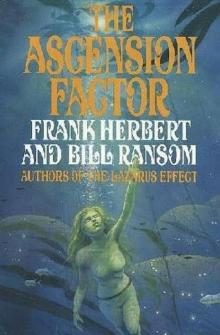 The Ascension Factor
The Ascension Factor The Heaven Makers
The Heaven Makers Children of Dune
Children of Dune Old Rambling House
Old Rambling House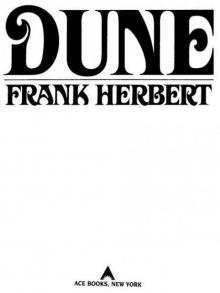 Dune
Dune The Worlds of Frank Herbert
The Worlds of Frank Herbert The Jesus Incident
The Jesus Incident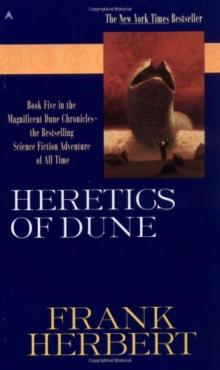 Heretics of Dune
Heretics of Dune Whipping Star
Whipping Star Dune Messiah
Dune Messiah Man of Two Worlds
Man of Two Worlds The Book of Frank Herbert
The Book of Frank Herbert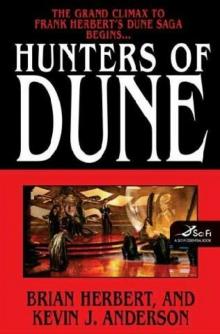 Hunters Of Dune
Hunters Of Dune The Tactful Saboteur
The Tactful Saboteur Soul Catcher
Soul Catcher God Emperor of Dune
God Emperor of Dune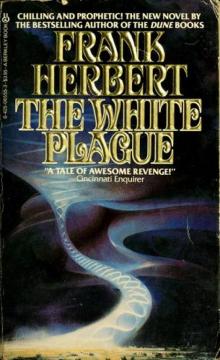 The White Plague
The White Plague The Green Brain
The Green Brain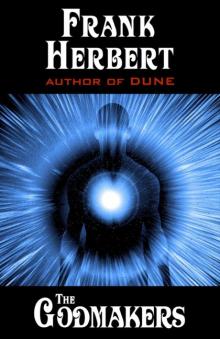 The Godmakers
The Godmakers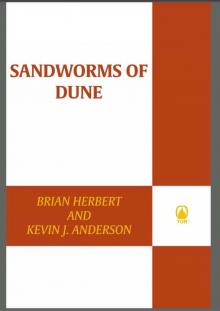 Sandworms of Dune
Sandworms of Dune Destination Void
Destination Void The Dosadi Experiment
The Dosadi Experiment Eye
Eye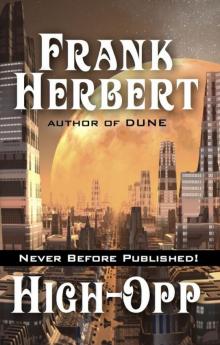 High-Opp
High-Opp The Eyes of Heisenberg
The Eyes of Heisenberg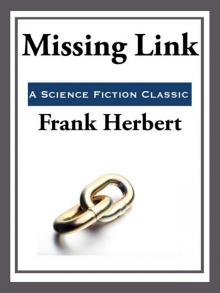 Missing Link
Missing Link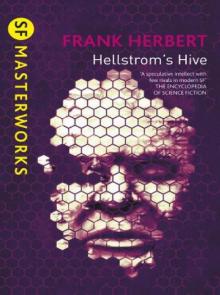 Hellstrom's Hive
Hellstrom's Hive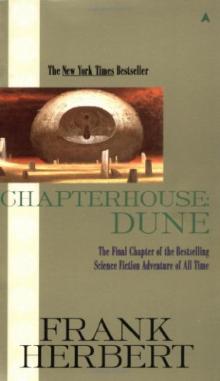 Chapterhouse: Dune
Chapterhouse: Dune The Santaroga Barrier
The Santaroga Barrier The Dragon in the Sea
The Dragon in the Sea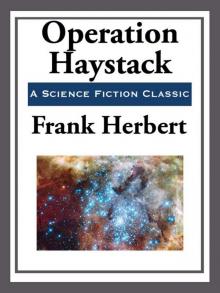 Operation Haystack
Operation Haystack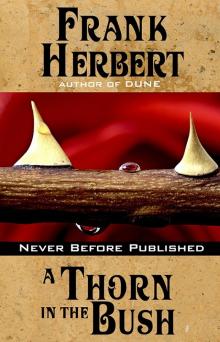 A Thorn in the Bush
A Thorn in the Bush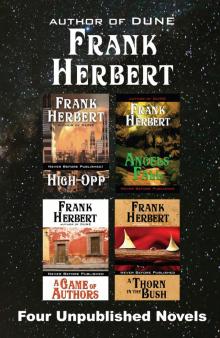 Four Unpublished Novels
Four Unpublished Novels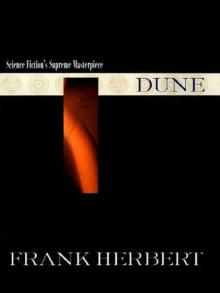 Dune dc-1
Dune dc-1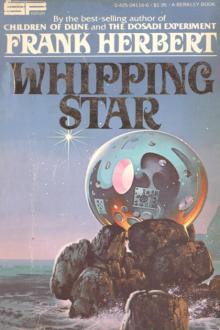 Jorj X. McKie 1 - Whipping Star
Jorj X. McKie 1 - Whipping Star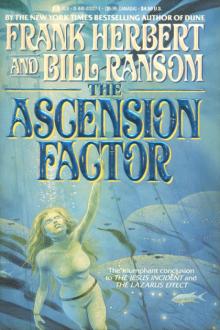 DV 4 - The Ascension Factor
DV 4 - The Ascension Factor Frank Herbert - Dune Book 4 - God Emperor Of Dune
Frank Herbert - Dune Book 4 - God Emperor Of Dune ChapterHouse: Dune dc-6
ChapterHouse: Dune dc-6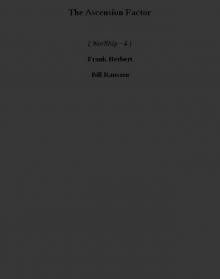 The Ascension Factor w-4
The Ascension Factor w-4 A Game of Authors
A Game of Authors Children of Dune dc-3
Children of Dune dc-3 Destination: Void: Prequel to the Pandora Sequence
Destination: Void: Prequel to the Pandora Sequence The Collected Stories of Frank Herbert
The Collected Stories of Frank Herbert Dune Messiah dc-2
Dune Messiah dc-2 Frank Herbert - Dune Book 5 - Heretics of Dune
Frank Herbert - Dune Book 5 - Heretics of Dune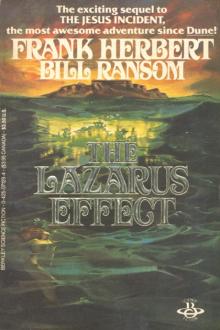 DV 3 - The Lazarus Effect
DV 3 - The Lazarus Effect The Jesus Incident w-2
The Jesus Incident w-2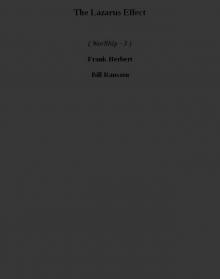 The Lazarus Effect w-3
The Lazarus Effect w-3 Frank Herbert
Frank Herbert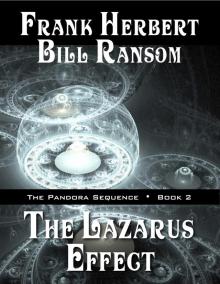 The Ascension Factor: Pandora Sequence
The Ascension Factor: Pandora Sequence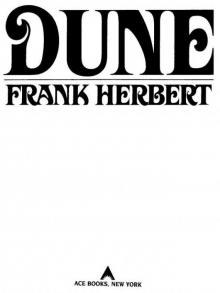 Dune (40th Anniversary Edition)
Dune (40th Anniversary Edition)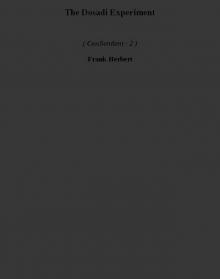 The Dosadi Experiment c-2
The Dosadi Experiment c-2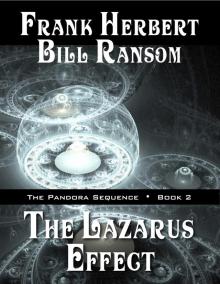 The Lazarus Effect
The Lazarus Effect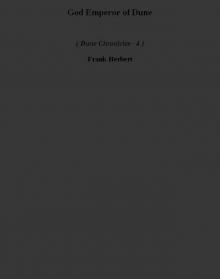 God Emperor of Dune dc-4
God Emperor of Dune dc-4 The Pandora Sequence: The Jesus Incident, the Lazarus Effect, the Ascension Factor
The Pandora Sequence: The Jesus Incident, the Lazarus Effect, the Ascension Factor The Green Brain (v4.0)
The Green Brain (v4.0) The Heaven Makers (v4.0)
The Heaven Makers (v4.0)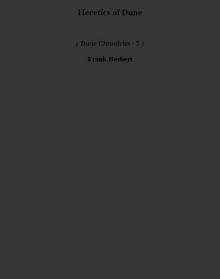 Heretics of Dune dc-5
Heretics of Dune dc-5